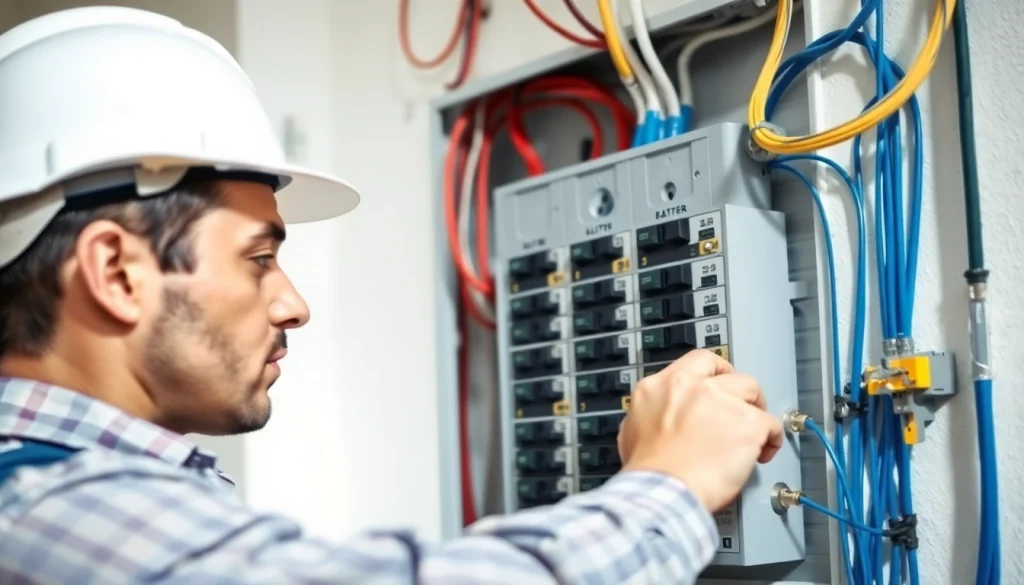
Understanding Electrical Service Types
Electrical services play a critical role in both residential and commercial settings, providing the necessary power that fuels our daily lives. From basic wiring installations to repairs, understanding the various types of electrical services available can help consumers make informed decisions. Here, we will delve into the core categories of electrical services, adjusting our focus to ensure clarity and comprehensiveness.
Residential Electrical Service Overview
Residential electrical service encompasses a wide range of installations and repairs designed for homes. It includes tasks such as wiring, lighting installations, electrical panel upgrades, and the installation of appliances. With an increasing demand for energy-efficient solutions, many homeowners are also seeking options for solar panel installations and smart home wiring. A reliable Electrical Service provider can assess each home’s needs, ensuring compliance with local codes and safety standards.
Commercial Electrical Service Insights
Commercial electrical services cater to businesses and organizations, often involving larger-scale projects compared to residential services. These can include the installation of complex wiring systems, lighting for large spaces like warehouses or office buildings, and systems for data management. Key differences in commercial services include the need for compliance with stringent safety regulations and the installation of specialized equipment, such as industrial generators or backup systems, to ensure business continuity.
Key Components of Electrical Service
Understanding the key components of electrical services is essential for both consumers and electricians. Various elements work together to form a comprehensive electrical system within a structure, each playing an essential role in safety, functionality, and efficiency.
Electrical Service Panels Explained
The electrical service panel, often referred to as the breaker box, is a crucial component found in every electrical system. It serves as the main distribution point for electricity throughout a building and houses circuit breakers that protect against overloads. Upgrading an outdated electrical panel can improve safety and accommodate modern energy demands, especially in homes that have undergone renovations or expansions.
Wiring Systems in Electrical Service
Wiring systems are another critical aspect of electrical services. Depending on the application—residential or commercial—different types of wiring materials and configurations are employed. Common types of wiring include non-metallic sheathed cable (Romex), conduit wiring for commercial setups, and specialized wiring for high-voltage applications. Proper installation and maintenance of wiring are essential to prevent hazards such as short circuits or electrical fires.
Electrical Meters and Their Importance
Electrical meters play a vital role in measuring the energy consumption of a property. They provide essential information for billing purposes and help homeowners and businesses monitor their energy usage, enabling them to implement energy-saving measures. Understanding how these meters function and the type of energy being consumed can significantly impact cost management and energy efficiency strategies.
Top Safety Practices for Electrical Service
Safety is paramount in electrical services due to the potential for hazards associated with electricity. Implementing proper safety practices helps reduce risks and protect both workers and the general public.
Common Hazards in Electrical Service
Electrical work comes with inherent risks, including electric shocks, falls from heights, and exposure to live wires. Identifying these hazards is the first step toward creating a safe work environment. Ensuring that all equipment is in good condition, using insulated tools, and wearing appropriate personal protective equipment (PPE) are fundamental practices that can mitigate many of these risks.
Protective Equipment for Electricians
Electricians should be equipped with the appropriate protective gear to enhance safety during electrical service tasks. Essential equipment may include insulated gloves, hard hats, safety goggles, and non-conductive footwear. Training in the proper use of this equipment can further reduce the risk of accidents on the job.
Procedures for Electrical Issues
Having clear procedures in place for electrical issues can save lives. All personnel should be trained in recognizing signs of a potential electrical and know how to respond. This training should include shutting off power safely, administering first aid for electrical burns or shocks, and evacuating a building if necessary. Regular drills can help ensure that everyone knows their roles during an , creating a safer environment overall.
Finding Qualified Electrical Service Providers
Choosing the right electrical service provider can make a significant difference in the quality and safety of work performed. There are several factors to consider when evaluating potential contractors.
How to Evaluate Electrical Service Contractors
When looking for a qualified electrical service contractor, it’s essential to verify their credentials. Check for appropriate licenses and insurance, as these are indicators of professionalism and compliance with safety standards. Additionally, seeking recommendations from trusted sources can provide insight into a contractor’s reputation and reliability.
Questions to Ask Before Hiring
Before hiring, consider asking potential contractors specific questions to gauge their expertise and reliability. Important topics to cover include their experience with similar projects, knowledge of local codes. Clear communication about expectations and timelines can also help to avoid misunderstandings later.
Comparing Quotes for Electrical Service
Once you’ve narrowed down your options, comparing quotes is an important next step. Look for detailed estimates that break down the costs of labor, materials, and potential additional expenses. While the lowest price may seem attractive, consider the value offered by each contractor, including warranties, after-service support, and reviews from previous clients. This comprehensive evaluation can lead to a more informed decision.
Maintenance Tips for Optimal Electrical Service
Regular maintenance is crucial for ensuring the longevity and efficiency of electrical systems. By prioritizing maintenance, homeowners and businesses can avoid costly repairs and safety issues down the line.
Regular Inspections and Their Benefits
Conducting regular inspections of electrical systems is key to identifying potential issues before they become serious problems. Scheduling inspections can uncover issues such as faulty wiring, overloaded circuits, or degradation of components due to wear and tear. Proactive maintenance can enhance performance and significantly extend the life of electrical installations.
Signs Your Electrical Service Needs Attention
It’s important to recognize the signs that your electrical service may need attention. Flickering lights, frequent circuit breaker trips, buzzing sounds from outlets, or a burning smell can all indicate underlying issues that need professional assessment. Addressing these signs promptly can prevent further damage and ensure the safety of the environment.
Long-term Care for Electrical Systems
Long-term care for electrical systems involves routine maintenance schedules, investing in quality components, and remaining vigilant about changes in energy needs within the property. Keeping up with advancements in energy management technology can also provide long-term cost savings and efficiency improvements. Engaging with a trustworthy electrical service provider for regular check-ups can ensure optimal functioning over the years.






